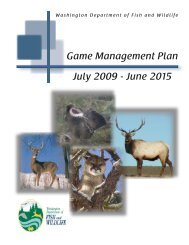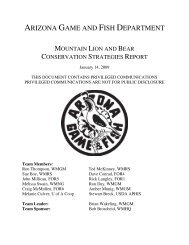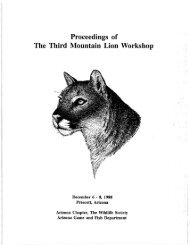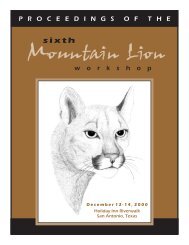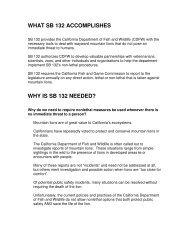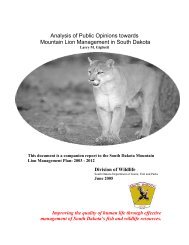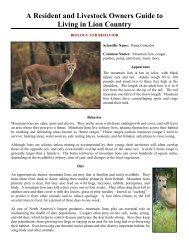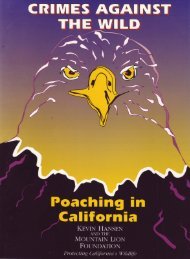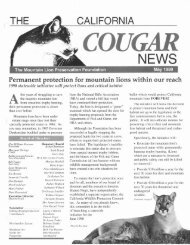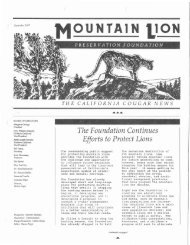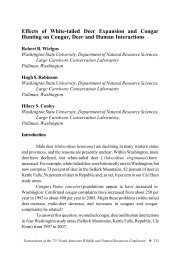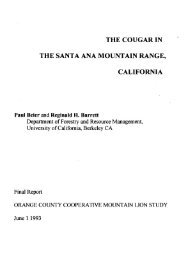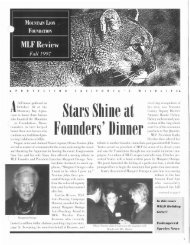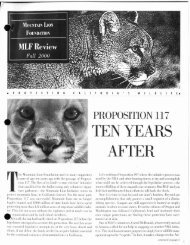Proceedings of the Ninth Mountain Lion Workshop - Carnivore ...
Proceedings of the Ninth Mountain Lion Workshop - Carnivore ...
Proceedings of the Ninth Mountain Lion Workshop - Carnivore ...
You also want an ePaper? Increase the reach of your titles
YUMPU automatically turns print PDFs into web optimized ePapers that Google loves.
Preface<br />
Chronology <strong>of</strong> <strong>Mountain</strong> <strong>Lion</strong> <strong>Workshop</strong>s<br />
1 st <strong>Mountain</strong> <strong>Lion</strong> <strong>Workshop</strong> – Sparks, Nevada, 1976<br />
2 nd <strong>Mountain</strong> <strong>Lion</strong> <strong>Workshop</strong> – St. George, Utah, 1984<br />
3 rd <strong>Mountain</strong> <strong>Lion</strong> <strong>Workshop</strong> – Prescott, Arizona, 1988<br />
4 th <strong>Mountain</strong> <strong>Lion</strong> <strong>Workshop</strong> – Denver, Colorado, 1991<br />
5 th <strong>Mountain</strong> <strong>Lion</strong> <strong>Workshop</strong> – San Diego, California, 1996<br />
6 th <strong>Mountain</strong> <strong>Lion</strong> <strong>Workshop</strong> – San Antonio, Texas, 2000<br />
7 th <strong>Mountain</strong> <strong>Lion</strong> <strong>Workshop</strong> – Jackson Hole, Wyoming, 2003<br />
8 th <strong>Mountain</strong> <strong>Lion</strong> <strong>Workshop</strong> – Leavenworth, Washington, 2005<br />
9 th <strong>Mountain</strong> <strong>Lion</strong> <strong>Workshop</strong> – Sun Valley, Idaho, 2008<br />
The 9 th <strong>Mountain</strong> <strong>Lion</strong> <strong>Workshop</strong> was held in Sun Valley, Idaho from May 5-9, 2008. The<br />
<strong>the</strong>me for <strong>the</strong> workshop was Past, Present, and Future Challenges. Organizers provided<br />
sessions for state and province status reports; interactions with humans and <strong>the</strong> urban interface;<br />
habitat use and movements; multi-carnivore and prey interactions; genetics and disease;<br />
population estimation and dynamics; education and social issues; and key concepts. During <strong>the</strong><br />
state status reports, <strong>the</strong> state managers were asked to provide <strong>the</strong> 2 primary issues <strong>the</strong>ir<br />
jurisdiction is dealing with in regards to cougar management. On <strong>the</strong> last day <strong>of</strong> <strong>the</strong> workshop, a<br />
panel <strong>of</strong> experts discussed <strong>the</strong>se issues and opened <strong>the</strong> discussion to workshop participants. A<br />
poster session was also provided with many excellent posters from students and researchers. The<br />
banquet night was also a 40 th anniversary celebration <strong>of</strong> cougar research by Dr. Maurice<br />
Hornocker and Wilbur Wiles in central Idaho, and we provided <strong>the</strong>m both with lifetime<br />
achievement awards.<br />
There were 165 registered participants. We received $34,902.81 in registration fees,<br />
contributions, sponsorships and vendor fees. We expended $33,067.48, which left us with<br />
$1,835.33 which will mostly go toward printing <strong>of</strong> <strong>the</strong> proceedings, <strong>the</strong> remainder will be sent to<br />
WAFWA. We provided each conference registrant with several conference items along with an<br />
abstract/agenda book for <strong>the</strong> price <strong>of</strong> <strong>the</strong> registration. Sun Valley is an expensive place to hold a<br />
conference, but due to vendors and sponsors, we were able to hold registration fees to $175.<br />
Thanks again to sponsors - The DeVlieg Foundation, The Cougar Fund, and <strong>the</strong> Felidae<br />
Conservation Fund. The rooms and facilities were top notch, banquet food was excellent, and I<br />
only heard praise about <strong>the</strong> facilities. We had two field trips, a bird watching expedition and a<br />
wolf viewing and management tour.<br />
Cougar management though different in each state does have overarching similarities.<br />
Management <strong>of</strong> problem cougars was a common <strong>the</strong>me in every state, particularly at <strong>the</strong> urban<br />
interface. Most states provide a protocol for dealing with problem cougars. Also <strong>of</strong> interest was<br />
<strong>the</strong> similarity in cougar population growth during <strong>the</strong> 1980’s and peaking in <strong>the</strong> mid late 1990’s,<br />
<strong>the</strong>n a decline during <strong>the</strong> last decade. This trend was found in almost every state including<br />
California where <strong>the</strong>y do not allow hunting. Funding, long-term research, and population<br />
estimation were all concerns. On Thursday afternoon <strong>of</strong> <strong>the</strong> conference, WAFWA cougar<br />
<strong>Proceedings</strong> <strong>of</strong> <strong>the</strong> <strong>Ninth</strong> <strong>Mountain</strong> <strong>Lion</strong> <strong>Workshop</strong> 1



